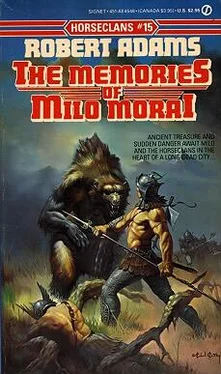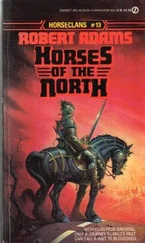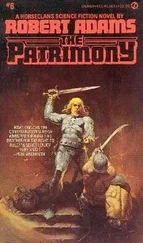“Priest,” said the captain, “your problem is plain—you wish us all to be as stubbornly, as stupidly fanatic as are you. Think you that you are the only living man who can read the journals of our ancestors, then? During the time of the Great Dyings, a man—man, mind you, no god—whose title was ‘governor’ sent our many-times-greatgrandsires here to prevent riot or looting in this town and the surrounding lands. There was a captain and two undercaptains, there was a man called first sergeant, several others also called sergeant and forty-seven others called various things, many of which terms do not seem to mean anything anymore. The gang of them were called a company and they belonged to a larger gang called a battalion which itself belonged to an even larger gang called a regiment and this largest gang was called the Missouri National Guard.
“About half of those men sent as Guardians of the town and lands died in the Great Dyings, as too did most of the folk hereabouts. A few more of the Guardians left to seek after their own dear kin, in other places, and even fewer ever came back, all telling tales of horror—of miles of countryside and of whole big towns in which no living man or woman or little child still lived, of pet dogs and cats and wild animals gorging on rotting bodies lying all unburied in any direction a man might look, of the pitiful few who had lived running and hiding alone and lunatic or banding together to loot and kill and rape and torture and mutilate and enslave.
“Those few of a few who came safely back, Priest, helped those who had remained to decide that it were best to stay here, safely away from the lunacy and barbarism and death that stalked the land and slunk through the corpse-clogged streets of the towns, else-where in the plague-blighted and desolate state that had been home.
“So our ancestors stayed here and worked the farms. They fought to hold the land and to protect their new friends and newer families from the dog packs and the even more dangerous roving man packs. And the land was good and productive, then; so long as the mechanical things still worked right and water could be brought up from deep, deep beneath the ground and there still were the big bags of powders to put into the fields, the work was light and the yield large enough to support everyone.
“But that Eden, like the original, did not last. Most of the mechanical things did not outlast the first generation. When there was no more of the special liquids that powered the farming devices and the things that made light and the pumps that brought up the water, then the old men of the first generation showed the men of the second how to dig ditches and canals and how to keep them filled from the creek both in high water and in low water, showed them how to ferment dung properly and plow it into the fields to replace the exhausted supplies of powders, showed them how to adapt or alter what they had to make plows and harrows and carts and wagons that could use animal power for draft. They took long, dangerous trips, those old men, to bring back books and things that would teach their sons how to make for themselves the thousand and one small and larger things they would need were they to survive and keep farming.
“Way back then, many of the second generationwere of a mind to leave hereabouts and find richer, better-watered land somewhere. But the men of the first generation had come to love the land their hands had worked and their sweat had watered—their journals tell all of this, Priest—and they also still recalled the horrors those few who had returned during the Great Dyings had recounted or seen. We all might have been far better off had everyone moved out then, but the first generation persuaded them all to stay.
“That was when the first words concerning a sacred vow and duty to protect the town from looters were spoken, written and melded with our religion. There is nothing sacred about the town, Priest—just because our ancestors said there was doesn’t make it so. It’s not the last of its kind and it’s far from the biggest; I’ve seen the ruins of much bigger ones during my travels before I came back here and married, and as we all know well, there’s a slightly smaller one a few days’ ride south of here from which we get our metals, so we too are looters, strictly speaking. And I have thought right often that it would’ve been a sight easier to have taken whatall we needed, whenever we needed it, from this town rather than that one.”
Most of the men seated along the sides of the long table looked at their elected leader with wide eyes registering shock and near-horror.
“Forsworn blasphemer, beware,” hissed old Mosix. “You counsel sacrilege!”
“Bullshit!” snapped the captain, with a hint of rising anger in his voice. “One ruin is not, cannot be any more sacred than another. Can’t you fools see the plain truth until your noses are rubbed in it? We all can read—if you don’t believe me about all I’ve said here today, for God’s sake, go into the library back yonder and read the old records and journals. I think Mosix here means us all well, but he either can’t or won’t admit to the pure fact that he is the priest of a religion that is in large part artificial, devised by our ancestors simply as a ruse to keep their sons and grand-sons from leaving this marginal farmland to seek a better, easier living elsewhere.
“Because of this manmade religion, generations of Mosix’s ilk have made things infinitely more difficult for folks who have been hard enough pressed just to wrest sustenance from our lands, by forcing them to wagon south to get supplies of metals and whatnot when the ruins just lay there, the metals rusting away and other useful things rotting in uselessness, giving lair to only bats and birds and reptiles and beasts.
“I tell you all, read the records and you’ll find that each successive generation of these priests has subtly changed this faith we hold just a little more. The first generation took things to help them from the ruins; so too did the second and the third. Where do you think they got most of the special liquids that powered their mechanical things, or many of the mechanical things themselves, or the powders for the fields? Why, from these so-called sacred ruins, that’s where.
“Yet now we not only are forbidden to draw metals or aught else from this crumbling town, we are even forbidden to hunt the beasts that inhabit it. Most of us have tracked her are dead certain that that she-bear as has been killing calves and goats is denning up some-where in the eastern part of the town, and there’s at least one big cat in there, too. But despite the losses and always looming danger to our kine and our kids and womenfolks, will Mosix and hiscrew allow us to go in and root out and kill those predators? You all know the answer to that, don’t you? Remember when Mosix forced the hanging of that dim-witted Snodgrass boy because he killed a few squirrels within the town?”
“Enough, captain!” snapped the elder priest. “I believe that what you are saying is that you will refuse to do your sworn and sacred duty. You are saying that you will not wash out the awful sacrileges and defilements perpetrated by these hellish looters in their blood, as your ancient duty demands. Sad, indeed, was the day when a man like you was chosen to be Captain of the Sacred Guardians.”
“You hear only that which you want to hear, Mosix,” snorted the captain. “I have said no such thing as you aver. What I have said is that we should not stay hereabouts, any of us that work for our living on this overdry, contrary land. So far as regards the men who took things from out of the city, I’ll lead half our company out and ambush them, then either kill them or drive them off. But, Priest, I won’t be doing it because of duty or honor or the supposedly holy things they took or the supposedly sacred nature of that ruined town or because you stamped your feet and slandered me like some spoiled, petulant child. No, I’ll be doing it simply because the fewer strangers near to my home and herds, the better.
Читать дальше












